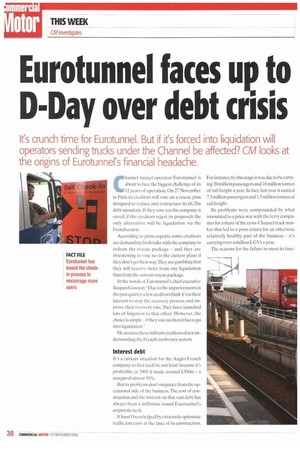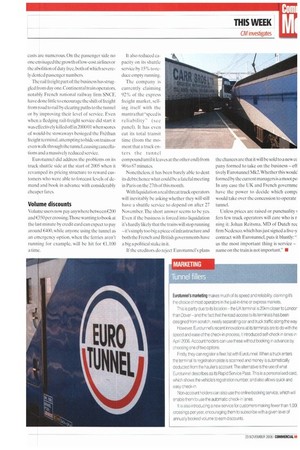Eurotunnel faces ue to D-Day over debt crisis
Page 30

Page 31

If you've noticed an error in this article please click here to report it so we can fix it.
It's crunch time for Eurotunnel. But if it's forced into liquidation will
operators sending trucks under the Channel be affected? CM looks at
the origins of Eurotunnel's financial headache.
Channel tunnel operator Eurotunnel is about to face the biggest challenge of its 12 years of operation. On 27 November in Paris its creditors will vote on a rescue plan designed to reduce and restructure its 16.2bn debt mountain. If they vote yes the company is saved; if the creditors reject its proposals the only alternative will he liquidation via the French courts.
According to press reports, some creditors are demanding fresh talks with the company to redraw the rescue package — and they are threatening to vote no to the current plans if they don't get their way.They are gambling that they will receive more from any liquidation than from the current rescue package.
In the words of Eurotunners chief executive Jacques Gounon:"Due to the improvements in the past quarter a few creditors think it's in their interest to stop the recovery process and improve their recovery rate,'Ibey have launched lots of litigation to that effect. However, the choice is simple —if they vote no then it has Logo into liquidation."
He accuses these militant creditors of not understanding the French insolvency system.
Interest debt It's a curious situation for the Anglo-French company to find itself in, not least because it's profitable: in 2005 it made around 1300m — a margin of almost 50%.
But its problems don't originate from the operational side of the business. The cost of construction and the interest on that vast debt has always been a millstone round Eurotunnel's corporate neck.
It hasn't been helped by extremely optimistic traffic forecasts at the time of its construction For instance, by this stage it was due to he carrying 20 million passengers and 10 million tonnes of rail freight a year. In fact, last year it carried 7.5 million passengers and 1.5 million tonnes of rail freight.
Its problems were compounded by what amounted to a price war with the ferry companies for a share of the cross-Channel truck market that led to a poor return for an otherwise relatively healthy part of the business — it's carrying over a million LGVs a year.
The reasons for the failure to meet its fore casts are numerous. On the passenger side no one envisaged the growth of low-cost airlines or the abolition of duty free.both of which severely dented passenger numbers.
The rail freight part of the business has struggled from day one. Continental train operators, notably French national railway firm SNCF, have done little to encourage the shift of freight from road to rail by clearing paths to the tunnel or by improving their level of service. Even when a fledging rail-freight service did start it was effectively killed off in 2000/01 when scores of would-be stowaways besieged the Frethun freight terminal, attempting to hide on trains or even walk through the tunnel.eausingcancellations and a massively reduced service.
Eurotunnel did address the problems on its truck shuttle side at the start of 2005 when it revamped its pricing structure to reward customers who were able to forecast levels of demand and book in advance with considerably cheaper fares.
Volume discounts
Volume users now pay anywhere between €200 and €350 per crossing.Those wanting to book at the last minute by credit card can expect to pay around MO, while anyone using the tunnel as an emergency option, when the ferries aren't running for example, will be hit for €1,100 a time. It also reduced capacity on its shuttle service by 15% to reduce empty running.
The company is currently claiming 92% of the express freight market, selling itself with the mantra that"speed is reliability" (see panel). It has even cut its total transit time (from the moment that a truck enters the tunnel compound until it leaves at the other end) from 90 to 87 minutes.
Nonetheless, it has been barely able to dent its debts: hence what could be a fateful meeting in Paris on the 27th of this month.
With liquidation a real threat truck operators will inevitably be asking whether they will still have a shuttle service to depend on after 27 November. The short answer seems to he yes. Even if the business is forced into liquidation it's hardly likely that the trains will stop running it's simply too big a piece of infrastructure and both the French and British governments have a big a political stake in it.
If the creditors do reject Eurotunnel's plans the chances are that it will be sold to a new cc pany formed to take on the business eft tively F.urotunnel Mk2. Whether this would formed by the current managers is a moot po In any case the UK and French gmemme have the power to decide which comp would take over the concession to operate tunnel.
Unless prices are raised or punctuality fers few truck operators will care who is r fling it. Johan Reitsma, MD of Dutch ree firm Nedexco, which has just signed a live-y contract with Eurotunnel, puts it bluntly: "1 us the most important thing is service name on the train is not important." •




































































































































































































































